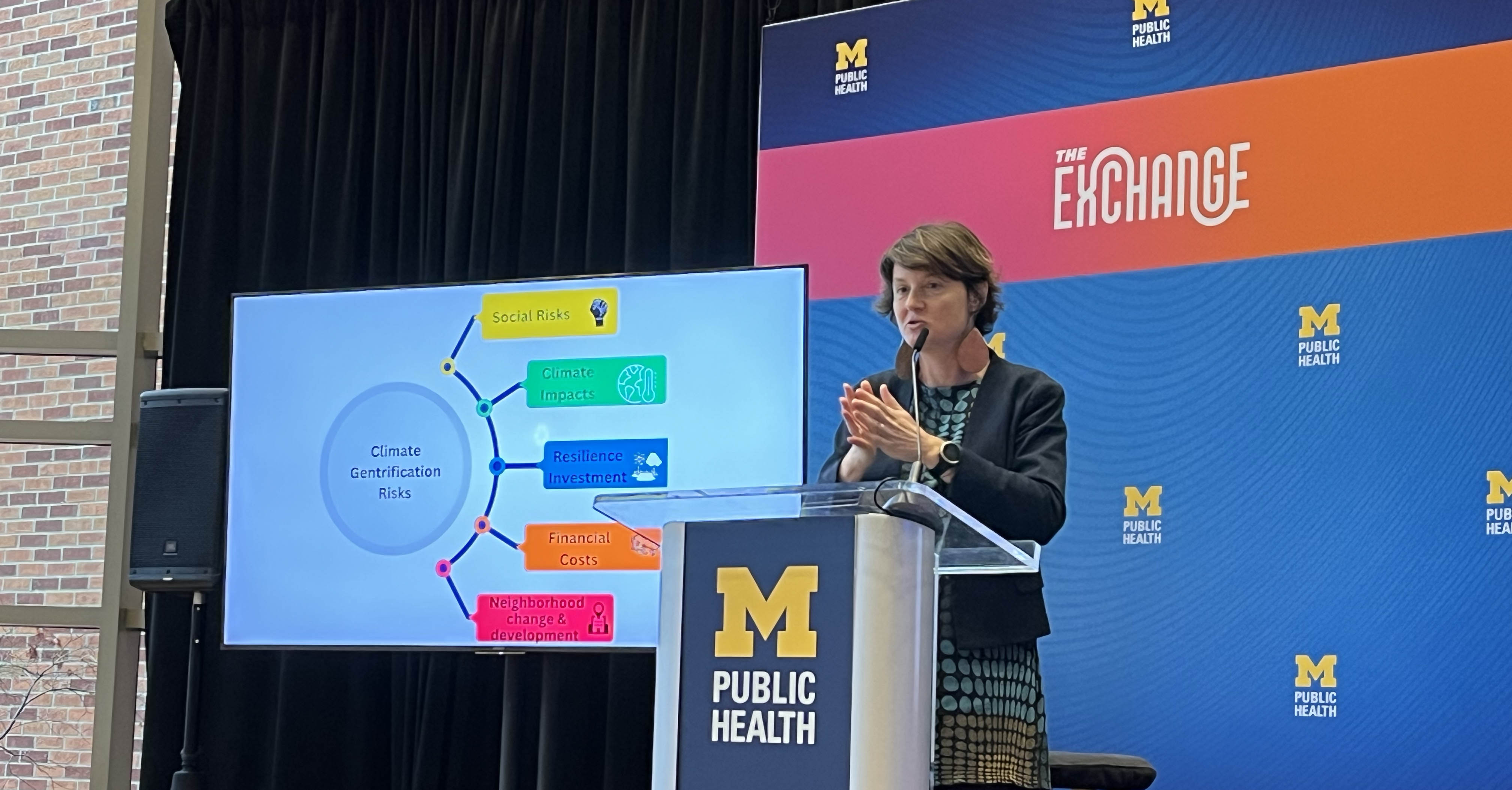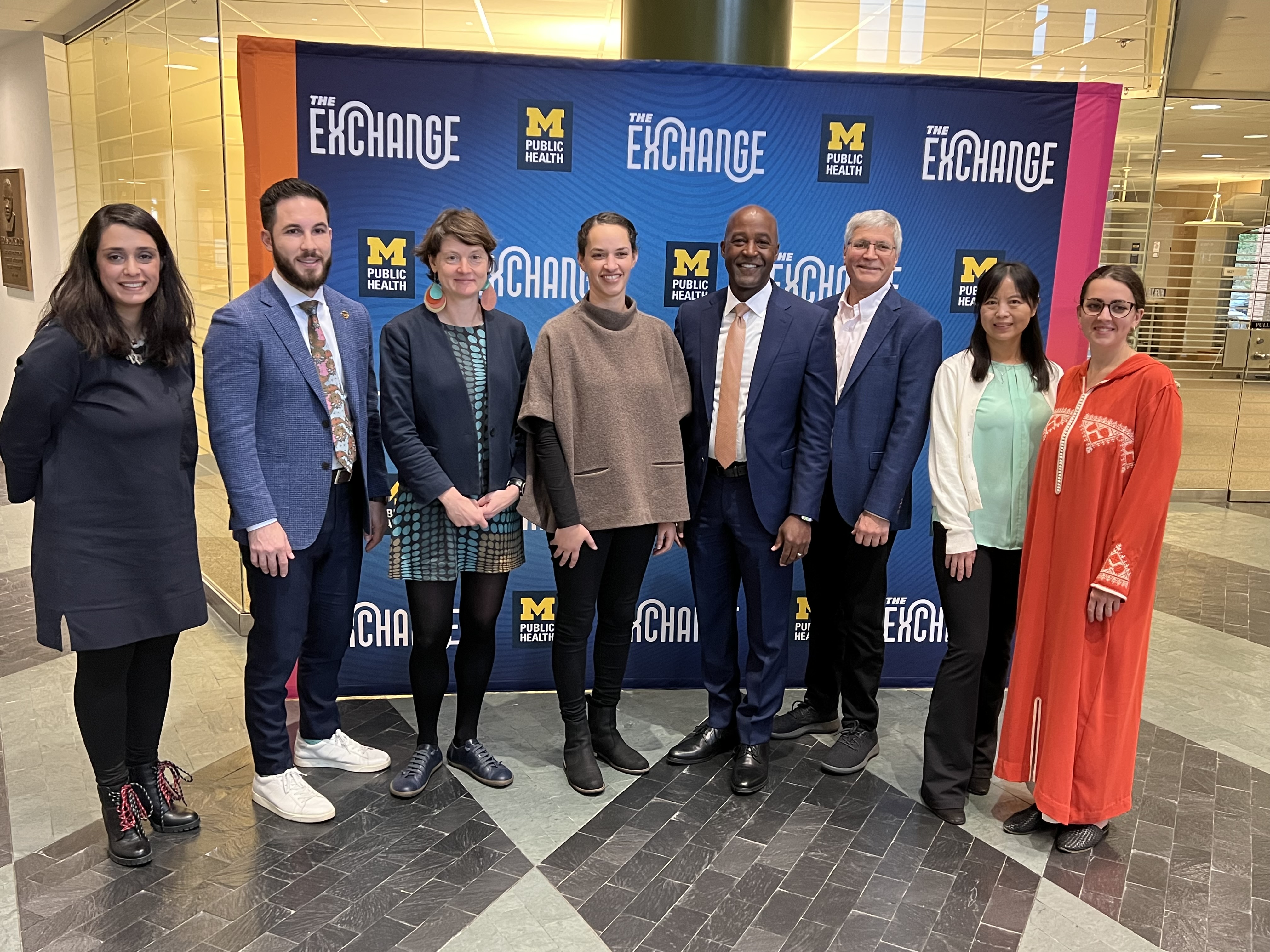Michigan Public Health launches new speaker series, The Exchange: Critical Conversations with Michigan Public Health

ANN ARBOR—The University of Michigan Public Health School of Public Health launched the inaugural event of its new speaker series, The Exchange: Critical Conversations with Michigan Public Health, on Nov. 8.
The theme of the event, The Future of Healthy Cities, aligns with one of the school’s four signature research initiatives, Public Health IDEAS for Creating Health and Equitable Cities.
Michigan Public Health hosted keynote speaker Isabelle Anguelovski, an international expert in urban and environmental planning, in the Paul B. Cornely Community Room. Anguelovski is the ICREA Research Professor at the Institute of Environmental Sciences and Technology in the Autonomous University of Barcelona.
“The primary goal of The Exchange is to create a space where academics, scholars and students from Michigan Public Health and other institutions can convene to discuss critical public health issues, exchange ideas and, ultimately, influence and accelerate a course of action to create a healthier, more equitable world for all,” said F. DuBois Bowman, dean of the School of Public Health.
Anguelovski, who also is the director of the Barcelona Lab for Urban Environmental Justice and Sustainability, shared her journey in public health and urban planning. She stressed the need for equitable access to green spaces in cities and the negative impacts of “green gentrification.” She described how a “green paradox” can create new forms of inequalities and segregation because living in gentrifying neighborhoods with green infrastructure is often unaffordable for working class people and minorities, who often move to cheaper, climate insecure, industrialized areas.
She cited a study that compares the role of greening in gentrification across 30 midsize cities in North America and Europe, using various methods to measure gentrification and attribute it to green spaces. The study found that greening has played a significant role in gentrification in 17 of the cities.
“City planners need to consider where disadvantaged residents live, work and get their basic needs to ensure more widespread benefits from city improvements and new infrastructures,” Anguelovski said. “Emerging forms of climate unfairness created by resilience planning should be challenged. City planning needs to have regular checks and balances because making our cities greener has long-term effects that aren’t neutral.”
After her presentation, Anguelovski was joined by Abdullah Hammoud, MPH ’12, mayor of Dearborn, Michigan; Marc Zimmerman, professor of Health Behavior and Health Education at Michigan Public Health; and Alexa Bush, program officer at the Kresge Foundation of Detroit; for a panel discussion, moderated by Roshanak Mehdipanah, associate professor of Health Behavior and Health Education.
Emerging forms of climate unfairness created by resilience planning should be challenged. City planning needs to have regular checks and balances because making our cities greener has long-term effects that aren’t neutral.”
— Isabelle Anguelovski
The 90-minute discussion included topics such as housing and social determinants of firearm violence in Detroit, adolescent health, violence prevention, and government leadership, and the importance of access and mobility in cities, particularly for pedestrians and those without access to cars.
Hammoud pointed out that the south side of Dearborn has the highest asthma rates in Michigan and provided some possible solutions, including adding a green space to act as a natural pollution buffer for nearby residential areas and an elementary school near a steel factory.
“The former industrial parcels will be rezoned to conservation, preventing industrialization in future,” the mayor said. “This undertaking aims to rectify disproportionate impact on certain areas. Effective communication about these changes can win political will and encourage further investments in neglected neighborhoods.”
Mehdipanah and Lu Wang, professor of Biostatistics at Michigan Public Health, co-lead the Public Health IDEAS for Creating Healthy and Equitable Cities initiative. They publicly launched their recently developed MI-HealthyCity Tool.
The tool is based on Urban HEART by the World Health Organization. It highlights health equity gaps by using benchmarks at the city and state levels across Michigan. In doing so, the tool helps local communities use evidence and act on their priorities with the support of local and national authorities by identifying and prioritizing interventions to address urban health inequities.
The former industrial parcels will be rezoned to conservation, preventing industrialization in future. This undertaking aims to rectify disproportionate impact on certain areas. Effective communication about these changes can win political will and encourage further investments in neglected neighborhoods.”
— Abdullah Hammoud
Michigan Public Health faculty then gave lightning talks on various subjects:
- Rick Neitzel, professor of Environmental Health Sciences, “Addressing Environmental Injustice in Detroit: Noise before and after a freeway redesign;”
- Allison Miller, professor of Health Behavior and Health Education, “A Place-Based Approach to Healthy Ypsi: Connecting Clinic and Community on Behalf of Families in Ypsilanti;”
- Jiyeon Song, a postdoctoral Biostatistics research fellow, “Developing a Spatio-Temporal Model to Assess the Impact of Greening Projects on Crime Reduction;;”
- Paul Fleming, associate professor of Health Behavior and Health Education, “Improving urban health
with unarmed non-police response programs: The CARE in Cities Project.”
The event concluded with a reception and a project showcase, featuring postdoctoral and graduate student research that represents the interdisciplinary field of urban health across the University of Michigan.
The next event in The Exchange series features Brandon Wolf, a leader in the movement to end gun violence. He is a survivor of the Pulse nightclub shooting in Orlando and press secretary for Equality Florida. The event will take place on Feb. 13, 2024, with more details forthcoming on The Exchange webpage.

